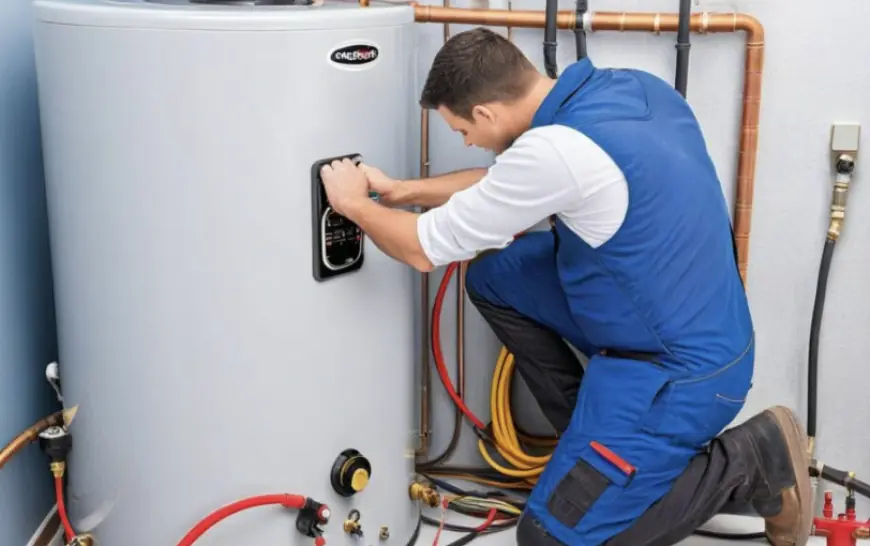Common Hot Water Repair Issues and How to Prevent Them

Hot water systems are essential for modern living, providing comfort and convenience for everyday tasks like showering, washing dishes, and laundry. However, these systems can sometimes malfunction, leading to costly hot water repairs and disruptions. Understanding common hot water repair issues and how to prevent them can help homeowners avoid inconveniences and maintain the longevity of their systems.
1. Leaking Water Heater
One of the most common issues with hot water systems is leaks. A water heater may leak due to:
-
Corrosion inside the tank.
-
Faulty temperature and pressure (T&P) relief valves.
-
Loose or damaged pipe connections.
Prevention Tips:
-
Regularly inspect the tank and surrounding areas for signs of leaks or moisture.
-
Flush the water heater annually to remove sediment buildup that could corrode the tank.
-
Replace T&P relief valves when they show signs of wear or leakage.
2. No Hot Water or Inconsistent Temperature
Lack of hot water can stem from several problems, including:
-
A failed heating element (in electric systems).
-
A malfunctioning pilot light or thermocouple (in gas systems).
-
Incorrect thermostat settings.
Prevention Tips:
-
Periodically check and adjust the thermostat to the recommended temperature (typically 60°C).
-
For gas systems, clean the burner assembly to ensure a steady pilot light.
-
Schedule professional maintenance to inspect and replace faulty elements before they fail.
3. Discoloured or Smelly Water
If your hot water has a rusty color or a foul smell, it could indicate:
-
Corrosion inside the tank.
-
Bacterial growth in the water heater.
-
A deteriorating anode rod.
Prevention Tips:
-
Inspect and replace the anode rod every 2-3 years to prevent corrosion.
-
Flush and sanitize the tank periodically to eliminate bacterial growth.
-
Install a water softener if your area has hard water, as it can accelerate tank corrosion.
4. Low Water Pressure
Low water pressure in your hot water supply can result from:
-
Sediment buildup in the tank or pipes.
-
Narrow or corroded pipes.
-
Faulty valves.
Prevention Tips:
-
Flush the tank annually to remove sediment.
-
Check and clean aerators and valves connected to hot water outlets.
-
Consult a plumber to inspect pipes and recommend replacements for aging systems.
5. Water Too Hot or Overheating
An overheating water heater can cause scalding risks and may damage the tank. This issue is often due to:
-
A malfunctioning thermostat.
-
A faulty temperature relief valve.
Prevention Tips:
-
Regularly test the thermostat and replace it if necessary.
-
Ensure the temperature relief valve is functioning correctly.
-
Keep the thermostat set to a safe range to avoid overheating.
6. Unusual Noises from the Water Heater
A rumbling or popping noise from the water heater indicates sediment buildup at the bottom of the tank. This sediment traps water, causing it to overheat and create steam bubbles.
Prevention Tips:
-
Flush the tank at least once a year to remove sediment.
-
Consider installing a sediment filter if your water supply has a high mineral content.
7. Pilot Light Keeps Going Out
For gas water heaters, the pilot light may go out due to:
-
A dirty or clogged pilot orifice.
-
A faulty thermocouple.
-
A draft extinguishing the flame.
Prevention Tips:
-
Regularly clean the pilot orifice to ensure a steady flame.
-
Replace worn-out thermocouples.
-
Protect the area around the heater from drafts and sudden airflow changes.
8. Water Heater Not Turning On
An electric water heater may fail to turn on due to:
-
A tripped circuit breaker.
-
A damaged power supply.
-
A defective heating element.
Prevention Tips:
-
Check and reset the circuit breaker if needed.
-
Inspect electrical connections for damage.
-
Schedule professional servicing to diagnose and resolve electrical issues safely.
General Maintenance Tips for Longevity
-
Schedule Annual Servicing: Professional maintenance can identify issues early and ensure all components work efficiently.
-
Check Insulation: Properly insulating your water heater and pipes reduces energy consumption and prevents freezing in cold weather.
-
Monitor Energy Bills: A sudden spike in energy usage might indicate an inefficiency in your water heater.
-
Invest in Quality Systems: High-quality, energy-efficient water heaters may cost more upfront but save money and effort in the long run.
When to Call a Professional
While preventive measures go a long way, some issues require expert intervention. Call a licensed plumber if you notice:
-
Persistent leaks despite maintenance.
-
Unusual smells or noises that persist after flushing.
-
Water heater parts that appear corroded or damaged.
Conclusion
Hot water systems are essential but prone to wear and tear. By understanding common repair issues and implementing preventive maintenance, homeowners can ensure their systems run smoothly for years. Remember, a little care today can save you from expensive hot water repairs and inconveniences tomorrow. For expert advice or servicing, always consult a licensed plumber.












